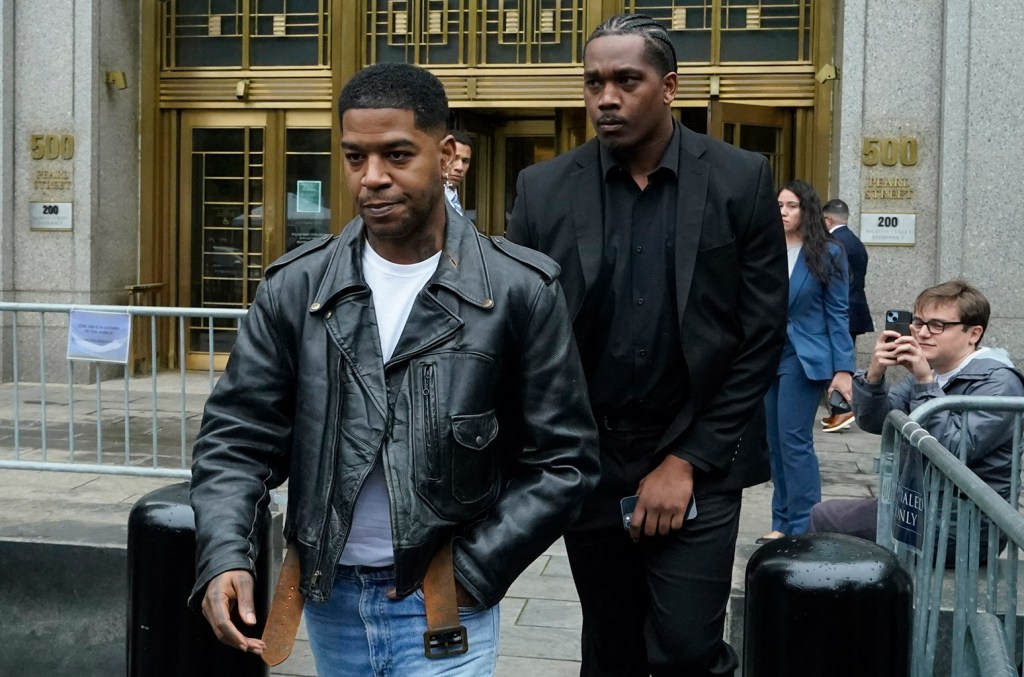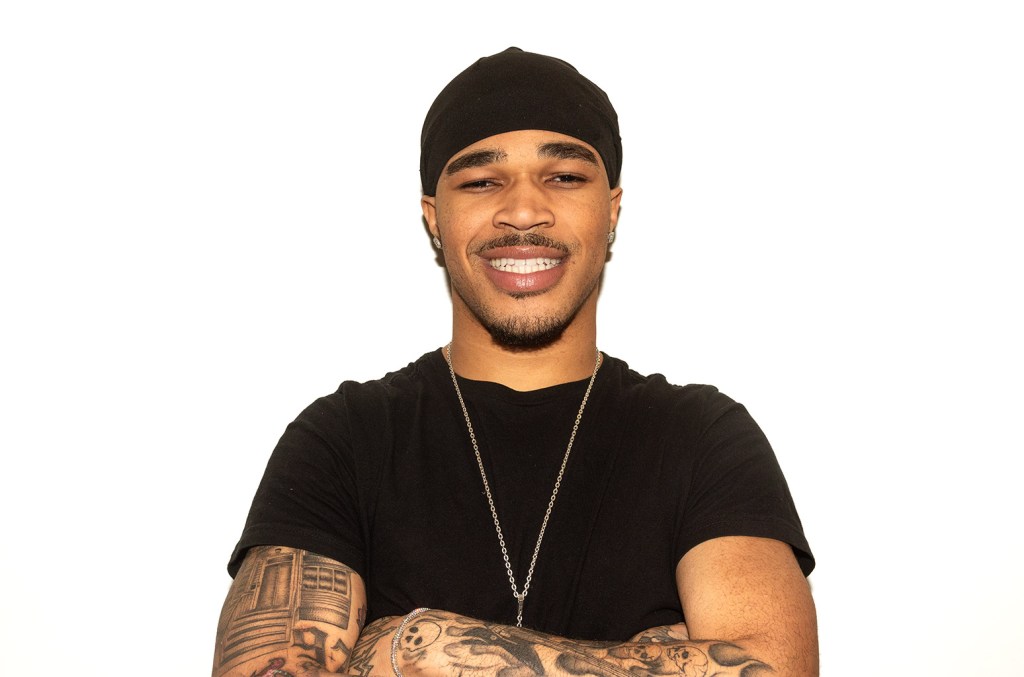Business
Page: 55
Kid Cudi took the stand as a witness in Diddy’s sex trafficking and racketeering trial on Thursday (May 22). Following his hours-long testimony surrounding his brief romance with Cassie in 2011, Cudi took to X to reflect on his time in court and thanked his fans for their support along the way.
“I’ve been seeing all the love and support and I just want to say thank you so much, man,” Cudi said. “People been hitting me up the past week just checking in and even today, it really means a lot to me, man. You guys are the best. I love y’all.”
Trending on Billboard
The Cleveland native continued: “This is a stressful situation. I’m glad it’s behind me. Yeah, I love y’all.”
Producer BNYX and Cudi’s fans showed their appreciation in his replies on X for taking the stand. “You did great Scott! Glad it’s over and done with,” one person wrote. While another added: “I’m so proud of you baby!!!!! Take time for yourself , you did that.”
The “Day ‘n’ Nite” rapper was questioned on the stand Thursday about his short stint dating Cassie in the early 2010s, and Cudi opened up about Diddy allegedly setting his Porsche on fire with a Molotov cocktail. Cudi also recounted a break-in of his home around the time of his relationship with Cassie, which he tied to Diddy.
Cassie’s initial bombshell 2023 lawsuit against Combs accused Diddy of blowing up Kid Cudi’s car in his driveway after repeatedly threatening Cudder.
“Too much danger, too much uncertainty of what could happen if we continued to see each other,” she reportedly said of why she ended things romantically with Cudi during her emotional testimony last week.
“[Diddy] said he wanted Scott’s friends to see Scott’s car blown up,” Cassie recalled. “We met, [Diddy], [Kid Cudi] and me. [Kid Cudi] said, ‘What about my vehicle?’ And [Diddy] said, ‘What vehicle?’ And that was the end of the meeting.”
The Bad Boy mogul could be sentenced to life in prison if found guilty on all counts of sex trafficking and racketeering. Diddy’s trial is expected to last into July.
Watch Cudi’s full statement on his experience at the Diddy trial below:
Taylor Swift is no longer facing a subpoena in the messy legal battle between her friend Blake Lively and Justin Baldoni after Baldoni dropped the document request, which Swift’s reps had fiercely criticized as “tabloid clickbait.”
Lively’s reps confirmed to Billboard on Thursday (May 22) that the Baldoni camp has dropped separate subpoenas they served on both Swift and her longtime law firm Venable earlier this month in litigation over the movie It Ends With Us, in which Baldoni and Lively are hurling dueling accusations of sexual harassment, retaliation and defamation.
Baldoni’s lawyers had sought communications between the Swift and Lively teams, claiming they heard from an unnamed source that Lively had asked Swift to delete text messages and tried to extort the pop superstar into publicly supporting her in the lawsuit. Lively’s reps denied those contentions as “categorically false,” and a judge quickly struck those claims from the case docket as improper, irrelevant and “potentially libelous.”
Trending on Billboard
Lively’s spokesperson says in a statement shared with Billboard that they are “pleased that Justin Baldoni and the Wayfarer parties have withdrawn their harassing subpoenas to Taylor Swift and her law firm.
“We supported the efforts of Taylor’s team to quash these inappropriate subpoenas directed to her counsel and we will continue to stand up for any third party who is unjustly harassed or threatened in the process,” the statement continues.
“The Baldoni and Wayfarer team have tried to put Taylor Swift, a woman who has been an inspiration for tens of millions across the globe, at the center of this case since day one,” Lively’s rep adds. “Faced with having to justify themselves in federal court, they folded. At some point they will run out of distractions from the actual claims of sexual harassment and retaliation they are facing.”
Venable also confirmed in a court filing Thursday that Baldoni withdrew his subpoena targeting the law firm.
Reps for Baldoni and Swift did not immediately return requests for comment Thursday. But a spokesperson for Swift previously said she had no involvement in It Ends With Us and slammed Baldoni for trying to “use Taylor Swift’s name to draw public interest by creating tabloid clickbait instead of focusing on the facts of the case.”
The It Ends With Us legal battle began in December when Lively alleged in a lawsuit that Baldoni had sexually harassed her on the set of the movie released last summer and later orchestrated a public relations smear campaign to retaliate against her for complaining about the behavior.
Baldoni then countersued Lively for defamation and claimed the actress leveraged her relationship with a “megacelebrity friend,” presumed to be Swift, to bully her way into more control of It Ends With Us.
Baldoni’s legal filing included text messages concerning an alleged meeting attended by “Ryan and Taylor,” seemingly referencing Swift and Lively’s husband, Ryan Reynolds. In one message sent by Lively, the actress called Swift and Reynolds her “most trusted partners” and compared them to the “dragons” in the TV show Game of Thrones.
“The message could not have been clearer,” Baldoni’s lawyers wrote in the countersuit. “Baldoni was not just dealing with Lively. He was also facing Lively’s ‘dragons,’ two of the most influential and wealthy celebrities in the world, who were not afraid to make things very difficult for him.”
Talent agent and Sound Talent Group (STG) owner Dave Shapiro, 42, was among those killed in a fiery plane crash in San Diego, Calif., in the early morning on Thursday (May 22), according to a statement from his agency.
“We are devastated by the loss of our co-founder, colleagues and friends,” said a spokesperson for Sound Talent Group. “Our hearts go out to their families and to everyone impacted by today’s tragedy. Thank you so much for respecting their privacy at this time.”
Shapiro and two other STG employees were killed when their 1985 Cessna Citation reportedly crashed around 4 a.m. on Thursday (May 22) in the Tierrasanta neighborhood. Billboard is not naming the two other victims at this time at the request of company officials, who are trying to notify family members. The plane was also carrying other passengers who have not yet been identified, officials tell Billboard, noting that there were no survivors.
A well-known music agent, Shapiro launched STG in 2018 with Tim Borror and Matt Andersen following successful careers at the Agency Group and United Talent Agency. His roster includes Sum 41, Pierce the Veil, I Prevail, Set it Off, Story of the Year, Silverstein, Parkway Drive and Eve 6. He also operates the Velocity Records music label, whose roster has included Thursday, Concrete Castles and Craig Owens.
Shapiro was also an avid pilot with more than a decade of flying experience and was the owner of Velocity Aviation, through which he offered pilot instruction. Known around the music industry as an adventurous spirit, Shapiro’s aviation website describes his thrill-seeking lifestyle and pursuit of adrenaline.
“From BASE jumping to aerobatic flying, Helicopters to twin engines, flight instructing to furthering his own education, doesn’t matter to Dave as long as he gets to be in the sky,” the website reads. At one point, Shapiro even housed the San Diego office of STG in an airplane hangar alongside some of his aircraft.
Besides aviation, Shapiro was a lifelong supporter of independent music and hard rock, punk and indie acts that didn’t fit within music’s mainstream. With the launch of STG, he and his partners paved the way for the launch of nearly a dozen independent agencies in the years that followed.
German concert promoter CTS Eventim’s revenue grew 22.0% to 498.6 million euros ($525 million), nearly doubling its 11.6% growth rate in the prior-year period. Adjusted earnings before interest, taxes, depreciation and amortization (EDITDA) rose just 8.9% to 100.3 million euros ($106 million). Adjusted EBITDA margin of 20.1% was more than two percentage points lower than […]

Live Nation announced a deal to operate Arena Cañaveralejo in Cali, Colombia, in partnership with Mexican promoter OCESA and Colombian promoter Grupo Páramo. The 15,000-capacity arena is the concert giant’s first venue in the country. Notably, Live Nation acquired a 51 percent interest in OCESA in 2021 for $416 million and a majority stake in Páramo in 2023. Upcoming concerts to be hosted at the venue, which was built in 1957 and underwent a major renovation in 2021, include a show by Fonseca and Andrés Calamaro. “This venue will allow us to bring more world-class artists to Cali while also supporting local talent and growing the live music ecosystem in Colombia,” said Live Nation president/CEO Michael Rapino in a statement. “Live Nation is committed to investing in Latin America’s thriving music scene, and this partnership with Grupo Páramo will help us create unforgettable experiences for fans in the region.”
Management at music video streaming service ROXi completed a buyout of the ROXi business in partnership with investors that include U.S. TV broadcasters Sinclair and Gray Media. The new company created under the deal, FastStream Interactive Limited, has struck distribution deals with U.S. broadcasters that will bring FastStream’s new interactive TV channels to their customers. The first FastStream-powered TV channel will be ROXi, which is touted in a press release as “America’s first Interactive TV Music Channel.” The channel will be available for free on NEXTGEN TV, a “new digital TV standard” in the U.S. “By 2028, over 75% of all US TVs sold will be NEXTGEN TV sets,” the release states. Shareholders in the new venture include Sinclair and Gray Media; U2 bassist Adam Clayton; Terra Firma founder Guy Hands; British billionaire businessman Jim Mellon; and Warner Mandel, a global co-head of telecom, media and technology at Rothschilds Warner Mandel.
Trending on Billboard
British indie label Cherry Red Records acquired U.K.-based Dome Records from directors Peter and Santosh Robinson. Dome’s catalog primarily consists of soul and R&B from artists including Lulu, Beverley Knight, Incognito, Hil St Soul, the James Taylor Quartet, Shaun Escoffery, Brenda Russell, George Duke, Anthony David, Jarrod Lawson and Andrew Gold. Peter Robinson will continue working with Dome as a consultant.
Independent New York-based rock label Equal Vision Records announced a partnership with kill iconic records, the label that sprang from the quarterly heavy and progressive music magazine kill iconic. Through the deal, kill iconic brings current artists Moondough, Lobby Boxer, ahh-ceh and Gold Necklace along with new signings Dwellings, Mella and Resilia. The first release under the agreement is the single “IDGAF2” by Dwellings, a Sacramento, Calif.-based post-hardcore band. Equal Vision also announced it has partnered with Burlington Record Pressing to open a boutique solar-powered manufacturing plant located in Albany, N.Y., that uses recycled and lead-free materials to create custom vinyl records.
SongTools, a marketing and ad tech solutions platform for music creators, teamed up with Latin American radio monitoring company monitorLATINO to launch digitalLATINO, a new platform that offers digital charts, playlist promotion, automated advertising campaigns and more for musicians. In other SongTools news, the platform has also been integrated into the marketing dashboard for Symphonic via a new partnership with the distributor.
ALTER Music, a new indie record label founded by former 300 Entertainment executives Rob Stevenson and Matt Signore, signed a joint venture partnership with Firebird, a multi-sector music company that invests in and services labels and publishers, with an emphasis on management and label services. Through the deal, Firebird will provide ALTER with financial, analytical and strategic support.
Web3-based distribution and label services company Unchained Music struck a manufacturing and distribution partnership with vinyl pressing plant Sonic Wax. Under the deal, select artists on the Unchained Web3 services platform will enjoy physical releases of their music. Sonic Wax is a global vinyl distributor that has served artists including Raye, Swedish House Mafia, Boy George, Masters At Work and Chase & Status.
Loaded Dice Entertainment, the newly launched full-scale label services and distribution company, signed a deal with e-commerce storefront and supplier Amaze Holdings. Through the agreement, Amaze — which utilizes a print-on-demand model to reduce merch overproduction — will host Loaded Dice-branded merchandise and artist-specific items. The first Loaded Dice artist to be hosted on Amaze is Hudson Thames.
German dance producer Marlon Hoffstadt has signed with Capitol Records, in partnership with multi-faceted music company Goodlife Management and MC3. “Marlon and his team have been building something incredibly special,” Capitol Music Group Chairman & CEO Tom March tells Billboard. “He has risen to become one of the most exciting artists in dance music. We’re […]
After a blockbuster 2024, PlaqueBoyMax has announced he’s signing to Captiol Records and Field Trip Recordings. The streaming star made the announcement on Thursday (May 22), with the producer capping off an insane year after emerging in 2024 with his Twitch series In The Booth and Song Wars. He dropped off his debut EP 5$TAR […]
Megan Thee Stallion’s legal team released a detailed report Thursday blasting claims from Tory Lanez’s supporters about new evidence that will exonerate him, calling them as “false narratives” from “foolish bullies.”
The report came after Lanez’s legal team claimed they had uncovered new evidence that would prove he did not shoot Megan in 2020, a crime for which he was convicted in 2022 and is currently serving a 10-year sentence.
In the 31-page document, Megan’s attorneys said claims of a new witness were “unsworn rumors being spread as fact” and that Ring camera footage of the 2020 shooting – purported to be new evidence of Lanez’s innocence – was already played at his trial.
Trending on Billboard
“Despite Mr. Lanez being convicted at trial by overwhelming evidence (that included his own admission of his guilt), he and his team – flanked by any ignorant person they can find – have pushed whatever misleading narrative they can,” said Alex Spiro, Megan’s longtime attorney.
“One by one, their misleading statements unravel and all that is left is the simple truth: he was convicted by overwhelming evidence and those who seek to traumatize the victim of the crime should be called out as foolish bullies,” Spiro added.
The new response echo Megan’s own statement on the claims. In a social media post Tuesday, the superstar said that “FACTS ARE FACTS” and that the case was already decided in court: “TORY PLEASE LEAVE ME ALONE you are a f–king demon.” SZA has also expressed support for Megan, saying Wednesday that she was “shocked” by statements supporting Lanez.
Lanez was convicted in December 2022 on three felony counts for shooting Megan in July 2020 during an argument following a pool party at Kylie Jenner’s house in the Hollywood Hills. In August 2023, he was sentenced to 10 years in prison. He has filed an appeal of that verdict, which remains pending.
Last week, Lanez’s legal team from the group Unite The People held a press conference claiming they had new evidence in the case. They argued that Bradley James, a bodyguard of Pete’s former friend Kelsey Harris, had overheard Harris say that she fired the gun – the central defense argument advanced by Lanez’s team during his trial.
Then earlier this week, Rep. Anna Paulina Luna (FL-R) called for the singer to be pardoned, claiming there was new “compelling evidence” that would exonerate him. In a later interview, Luna cited surveillance footage that she said corroborated James’ account.
But in Thursday’s report, Megan’s team said both of those claims were false. They noted that James was “not present at the scene of the crime” and had never spoken publicly about the case, in court or otherwise.
“James has not publicly addressed these claims himself — Peterson’s team merely alleges what James said,” Spiro and the other lawyers write. “Despite being cited as a key source, James failed to appear at the press conference to support these allegations.”
As for the surveillance footage, they argued that was nothing new: “There is no new Ring camera footage,” Megan’s lawyers write. “The Ring camera footage was previously admitted as evidence during Lanez’s trial, it was played for the jury, and the footage captured the sound of 5 gunshots.”
They also say other claims from Lanez’s supporters – including longstanding suggestions that DNA evidence calls his guilt into question – are also false: “When the firearm was tested by DNA experts, testing established that there was a 90% chance that the DNA found came from a man.”
A representative for Unite The People did not immediately return a request for comment. Lanez’s appeal of his verdict, lodged with California’s 2nd Appellate District, has been fully briefed since October but has not yet been argued before the court.

Anti Social Camp, an annual songwriting camp and music festival, is returning for its fifth year. Taking place from June 9-13 in venues across New York City, the camp will feature Cigarettes After Sex, Beach Bunny, Bryce Vine, Walk the Moon, Taja Kumari, Evan Giia, Louis Cato from The Late Show with Stephen Colbert and 250 more creatives.
Over the last five years, Anti Social Camp has cemented itself as a mainstay during New York Music Month, connecting artists, songwriters and producer from across the globe. Part of its mission is to revitalize New York’s place in the music industry and to connect artists at a time where “we’re increasingly isolated,” says founder Danny Ross. To do that, Anti Social Camp will feature 200 recording sessions across 40 studios. Additionally, the event boasts 10 public events at venues across the city.
Unlike most other songwriting camps, which are private and exclusive, Anti Social Camp invites hundreds of creatives into the fold, and it pairs these writing sessions with public-facing music events so that everyone can get in on the fun. Events include the Spotify Industry Showcase, the YouTube Writers Round, An Evening With Republic Records, Recording Academy Anti Social Gala and more.
Trending on Billboard
This year, Cigarettes After Sex will receive the Anti Social ICON Award at the iHeartRadio Anti Social Music Conference on Monday, June 9 at The New School’s Tishman Auditorium. Additionally, Anti Social will feature a conversation with hitmaker Scott Harris, best known for his work with Shawn Mendes, The Chainsmokers and Justin Bieber.
“At a time when we’re increasingly isolated, the need for building community among creatives — in the same place at the same time — is more important than ever. Not just for artists, but for every person who listens to music,” says Ross. “We are artists, songwriters and producers ourselves, so we created the kind of global festival we would want to attend. Beyond recording hundreds of new songs, Anti Social Camp is a forum to interact with every sector of the music industry and shape the future we want to see.”
Anti Social Camp 2025 presenting partners include TIDAL, TikTok and Jack Daniel’s; principal partners include Udio, SESAC, Soundstripe, The New York City Mayor’s Office of Media + Entertainment, The Orchard, Sony Audio, AutoTune, DistroKid, The MLC, Spotify, YouTube Songwriters, Output, EMPIRE, BMI, Cloud Microphones, Songtrust, Kosign, Amazon Music, ASCAP, Topo Chico, Brewery Ommegang, iHeartRadio, Recording Academy New York Chapter, Groover, Jammaround and Muse.
Venue partners include Republic Records, Music Hall of Williamsburg, Xanadu, BerkleeNYC Power Station,The School of Jazz & Contemporary Music at The New School, Flux Studios, Feirstein Graduate School of Cinema at Brooklyn College, 99 Scott and The Ace Hotel.
Studio partners include Republic Studios, The Cutting Room Studios, Warner Chappell, YouTooCanWoo, Second Take Sound, 343 Labs,Platinum Sound Studios, Ultra Publishing Studios, Amazon Music Studios, The Penthouse, Dimension 70, Flux Studios NYC, Nowhere Studios, Cloud Union Studio, Synthia Studios, Analogue Muse, Biscuit Head Collective, Fraser Sound Studios, Subdecibel Sound, Tightrope Recording, Antenna Studios, The Sweet Spot and ANTVGONIST Studios.
Orfeón, one of the longest-standing indie labels in Latin America, announced on Thursday (May 22) that it has entered a strategic alliance with label and distribution company ONErpm.
The collaboration aims to “strengthen” the digital presence of Orfeón’s music catalog, made up of seven decades of recordings including more than 300 artists and 150,000 songs ranging from bolero, ranchera, danzón, mambo, tropical pop and rock & roll. Orfeón — previously distributed by Warner Music — has been home to legendary artists including Pedro Infante, Celia Cruz, Agustín Lara, Chavela Vargas, Javier Solís, Lola Beltrán and Toña la Negra.
“In this restructuring of Orfeón, we have sought the best partner today for digital distribution,” Edmundo Monroy, CEO of Fórmula Music Group, tells Billboard. “ONErpm presented us with the best option in technology, the best option in development with streaming platforms, the best analytics, and today it seems, for us, the best company to distribute our music globally. We have been talking for months and now we’re entering a new era to maximize Latin American music around the world.”
Trending on Billboard
The alliance is more than just a distribution deal. It also includes marketing plans that aim to expand Orfeón’s catalog to new markets and a new generation of music fans, adds Adriaan Glastra, GM of ONErpm Mexico.
“Orfeón has a historic catalog, and being part of Grupo Formula they have an enormous reach, plus they are also launching new artists, we were obviously pursuing this [partnership],” says Glastra. “There is a synergy we have with them, which will lead to growth on both sides. We have a lot of plans to bring this historical catalog, all the stuff they are set to release in the future, to new generations.”
The first release under the new alliance will be a Lupita D’Alessio album recorded with a symphonic orchestra live from the Arena Cuidad de México. It will be out Friday (May 23) with a vinyl component set to be released soon after.

 State Champ Radio
State Champ Radio 








